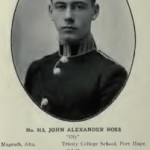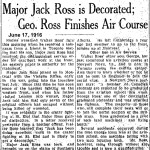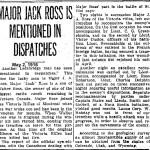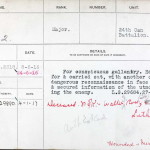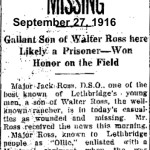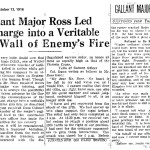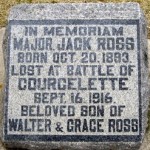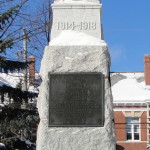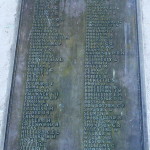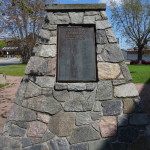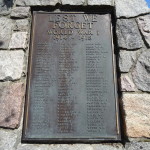
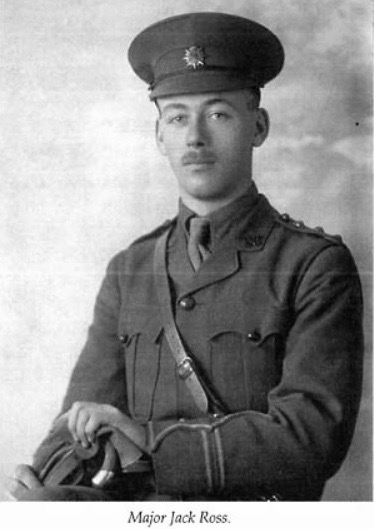
| Personal Details | |
| Date of Birth | October 20, 1893 |
| Place of Birth | Kenora, Ontario |
| Country | Canada |
| Marital Status | Single |
| Next of Kin | Walter Ross (father), 6 Oliver Blk., Lethbridge, Alberta |
| Trade / Calling | Rancher |
| Religion | Presbyterian |
| Service Details | |
| Regimental Number | NA |
| Service Record | Link to Service Record |
| Battalion | 24th Battalion |
| Force | Canadian Expeditionary Force |
| Branch | Canadian Infantry |
| Enlisted / Conscripted | Enlisted |
| Address at Enlistment | Lethbridge |
| Date of Enlistment | December 1, 1914 |
| Age at Enlistment | 21 |
| Theatre of Service | Europe |
| Prisoner of War | No |
| Survived War | No |
| Decorations and Medals | Distinguished Service Order |
| Death Details | |
| Date of Death | 19160917 |
| Age at Death | 23 |
| Buried At | No known grave/Vimy Memorial |
Ross, John Alexander
John Alexander Ross, known as Jack to many and as Oley to his closest friends, was born in what was then Rat Portage (later renamed Kenora) in October 1893 to Walter and Grace Ross. His parents had married in 1888 in Windsor, Ontario and moved to Rat Portage a short time later. Their first child, daughter Eileen, died as an infant in 1890 and Jack’s older brother George was born in 1891. Grace passed away in 1895, when Jack was two years old, and in the early 1900s Walter and the two boys moved west to Alberta. Walter established Ross Ranches on the Milk River Ridge, near Lethbridge, and by 1912 he and his partner were shipping 2,000 to 2,500 steers each year to the Chicago markets.
Even as a youngster Jack Ross had been fascinated with the military and his dreams came true in 1911 when, after attending Trinity College preparatory school in Port Hope, Ontario, he was accepted at Canada’s prestigious Royal Military College in Kingston, Ontario. He excelled there, especially in the military arts, earning the honour of being one of the cadet corps company commanders in his third year.
His father’s illness compelled him to resign from the college during his final year to return to Alberta to help run the family cattle ranch near Lethbridge, but when war broke out his sense of duty took him to Montreal where he enlisted on Dec. 1, 1914, being assigned to the 24th Battalion (Victoria Rifles).
Because of his military college training he was given a commission as a lieutenant and then quickly promoted to captain. By the time the battalion headed overseas in May 1915, Ross, at age 21, was a major in charge of a full company of 200 men — the second youngest man to hold the rank in British Empire forces at the time according to a newspaper report.
On the battlefield in France, Ross proved to be an excellent officer and it was there in April 1916 he earned the Distinguished Service Order, the British Empire’s gallantry award second only to the Victoria Cross. Only 710 DSOs were awarded to Canadian officers during the First World War.
Ross’ exploits in the field also earned him two Mentioned in Dispatches. The London Gazette entry for his DSO, dated June 24, 1916, reads: ‘He volunteered for and carried out with another officer, a very dangerous reconnaissance in face of heavy fire and secured information of the utmost value regarding the enemy.’
Major Jack Ross’ war ended just months later. On Sept. 17, 1916, a year to the day after arriving in France, he died leading his company in an attack against the German lines near Courcelette, France. His commanding officer, Col. J.A. Gunn, in a letter to the family published in the Lethbridge Herald the following month, praised Major Ross for his actions on the day. Ross had been struck in the neck by shrapnel from an exploding shell prior to the attack and was on his way to the battalion’s medical aid station when the word of the planned 5 p.m. attack came down the line. Refusing aid, he returned to his company to lead his men. The troops ran into a wall of fire within 75 yards of their advance, wrote Col. Gunn, and only four men of Major Ross’ company survived the brutal battle.
The unit’s war diary records that two of three companies involved in the evening attack reached their objectives, however the company led by Ross encountered heavy fire due to preliminary artillery shelling landing behind, rather than on the German front line positions.
‘ ‘many of the men being killed before they got over the parapet, and the men who managed to advance, were held up in the German wire and shot down. With regard to this attack, if the artillery preparation had been in any way adequate, there is no doubt but that the objective would have been obtained along the whole line.’
Casualties for the battalion totalled nine officers and 330 other ranks killed, wounded or missing. Ross was at first declared missing in action and thought to have been taken prisoner by the Germans, but was later determined to have been killed in action. His body was never recovered.
His father Walter was presented with Major Ross’ DSO by the Duke Devonshire at a ceremony in December 1917 in Lethbridge.
His brother George Graham Ross became a pilot with the Royal Air Force. He returned home to Canada in 1919 and married a war bride, Rodney Whitson Ogg, in September 1919 in Montreal. They lived on the family ranch in Alberta and later, with his three sons, George established Lost River Ranches Limited. See article here. George died in June 1956.
Major Jack Ross is commemorated on the Vimy Memorial, at the Royal Military College, and on the Cenotaphs in Kenora, Ontario and Lethbridge, Alberta.
by Bob Stewart
Notes: photo from The Stone Frigate, 1914, RMC Year Book; newspaper clippings from Lethbridge Herald Archives
